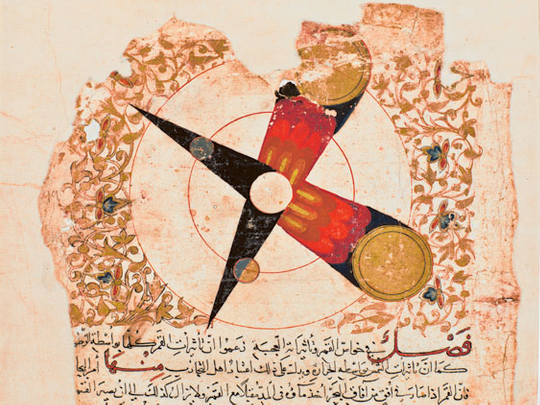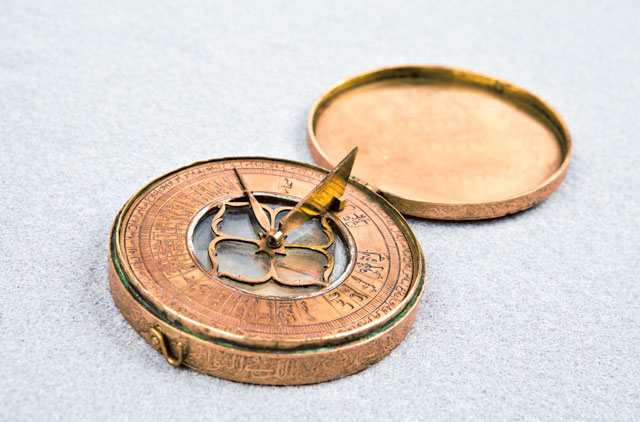
For those who think the Greeks and Romans invented everything, a visit to two exhibitions at Doha’s Museum of Islamic Art (MIA) will prove to be an eye-opener. “1001 Inventions” and “Arabick Roots” offer visitors a wonderful opportunity to acquaint themselves with the contributions of Muslim scientists and scholars to modern science.
“We owe our rich scientific heritage to cultures and civilisations worldwide. With these two exhibitions we rediscover some of the roots of modern civilisation,” says Aisha Al Khater, director, MIA.
Linked by the theme, “Explore our past to inspire our future”, the exhibitions aim to inform and educate the younger generation about the rich heritage of the golden age of the Muslim civilisation.
“By reinvigorating this theme and showcasing past and modern thinkers, we hope to stimulate young minds and revive the respect that all cultures deserve,” Al Khater says.
Curated by Rim Turkmani, “Arabick Roots” explores the eastern influence on the scholars of 17th-century Europe. There is now evidence that the 17th-century scholars of the scientific revolution appreciated and built on ideas from other times and places and honoured their pioneers.
“The most important lesson I’ve learnt from developing ‘Arabick Roots’ is the meaninglessness of the term ‘clash of civilisations’ — when cultures learn from each other, they are unlikely to belittle one another,” Turkmani says.
An astrophysicist at the Imperial College and specialist in the history of Islamic Science and its influence on Europe during the scientific revolution, Turkmani converted her research into the “Arabick Roots” exhibition, which first opened at London’s Royal Society in 2011. “I now believe that an understanding of science’s international heritage is essential for its progress,” she says.
“1001 Inventions”, set up in a tent at the MIA park, has an introductory film featuring Ben Kingsley and is split into several zones such as the Library of Secrets, World Zone, Hospital Zone and the Ibn Al Haytham Zone, among others.
“Muslim civilisation stretched from southern Spain as far as China, and for a thousand years, scholars of many faiths built on the ancient knowledge of the Egyptians, Greeks and Romans, making breakthroughs that helped pave the way for the Renaissance,” says Ahmad Salim, producer and director of “1001 Inventions”.
“The discoveries made by men and women in Muslim civilisation — from automatic machines and medical marvels to astronomical observations and inspiring architecture — have left their mark on the way we live today,” he says.
Complementing each other, “1001 Inventions” takes visitors through the works of scientists and scholars during the golden age of Muslim civilisation while “Arabick Roots” reveals the influence of this science on the scientific revolution and lifestyle in Europe in the 17th century through the magnificent objects and priceless manuscripts on display.
“1001 Inventions” celebrates innovative inventions whose impact on science and technology can still be seen in the modern world today. For instance, the experimental scientific method, the basis of all modern technological advancement, came from the work of Hassan Ibn Al Haytham a thousand years ago.
Al Haytham laid the foundations of optics, including the explanation of the scientific phenomenon “camera obscura” — which is the basic principle used in today’s cameras.
Many of Al Haytham’s works were translated into Latin by the medieval scholar Gerard of Cremona. Al Haytham’s “Book of Optics” had a profound influence on many scientists in Europe and that lasted until the 17th century.
Apart from Al Haytham, visitors will also be introduced to master engineer Al Jazari, inventor of the fabled “elephant clock” and numerous mechanisms that are used in the machines of today.
Presented in a fun, interactive manner, the show also highlights the work of Andalusian physician Al Zahrawi, who invented hundreds of surgical instruments and procedures more than a thousand years ago that are still saving lives in modern hospitals, and Fatima Al Fihri, the young woman who founded and designed the world’s first modern university, which offered free education to men and women of all backgrounds.
1001 Inventions will run until November 12 and Arabick Roots until January 2013, at the Museum of Islamic Art in Doha.
A matter of pride
“1001 Inventions” is a brand that has reached more than 50 million people worldwide and highlights feats of the golden age of Muslim civilisation, including the first modern university that was set up by Fatima Al Fihri in Fez, ancient time-telling machines, surgical tools and mechanical devices.
Through its award-winning educational programmes, books, blockbuster exhibitions, live shows, films and learning products, “1001 Inventions” showcases the contributions of inspirational men and women of different faiths and cultures in a civilisation that spread from Spain to China.
The Doha exhibition was specially adapted for the Qatari audience through a collaboration between “1001 Inventions” and MIA, and is expected to be a launch pad for MIA’s own internationalised, touring exhibition.



